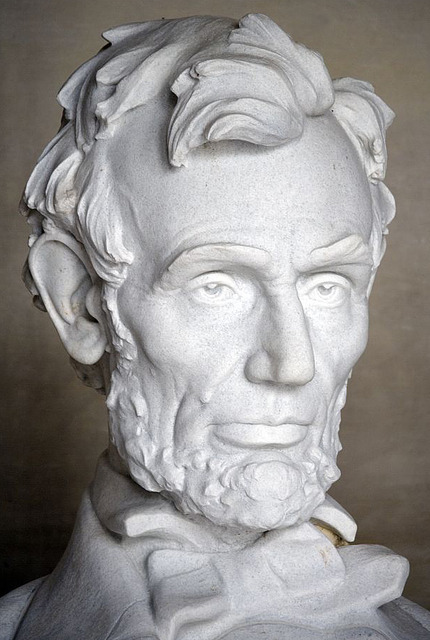 Perhaps Lincoln’s most enduring legacy has been his reputation as “Savior of the Union.” Most Americans venerate him as the essential president –the one who saved the nation at its moment of greatest peril. But in the classroom, that marble image can take a significant beating as teachers and students find themselves arguing over Lincoln’s actions as commander in chief. In particular, Lincoln’s defiance of Chief Justice of the United States Roger Taney (Dickinson College, Class of 1795), over the issue of civil liberties leaves many students wondering at what cost was the union saved. Documents in this section offer Lincoln’s perspective and numerous examples of his rigorous defense of his administration’s wartime policies.
Perhaps Lincoln’s most enduring legacy has been his reputation as “Savior of the Union.” Most Americans venerate him as the essential president –the one who saved the nation at its moment of greatest peril. But in the classroom, that marble image can take a significant beating as teachers and students find themselves arguing over Lincoln’s actions as commander in chief. In particular, Lincoln’s defiance of Chief Justice of the United States Roger Taney (Dickinson College, Class of 1795), over the issue of civil liberties leaves many students wondering at what cost was the union saved. Documents in this section offer Lincoln’s perspective and numerous examples of his rigorous defense of his administration’s wartime policies.
Essential Question
How should we teach Lincoln’s nationalism?
Featured Documents
- March 4, 1861 –First Inaugural Address (#11)
- August 22, 1862 –Letter to Horace Greeley (#4)
- November 19, 1863 –Gettysburg Address (#1)
- August 23, 1864 –Blind Memorandum (#8)
- March 4, 1865 –Second Inaugural Address (#3)
Additional Documents
- December 10, 1860—Letter to Lyman Trumbull (#45)
- December 11, 1860—Letter to William Kellogg (#83)
- December 15, 1860—Letter to John Gilmer (#109)
- January 1861—Fragment on the Constitution (#50)
- February 21, 1861—Address to New Jersey Senate (#148)
- February 22, 1861—Address to PA House of Representatives (#126)
- April 1, 1861—Letter to William Seward (#56)
- April 15, 1861—Presidential Proclamation (#41)
- April 19, 1861—Presidential Proclamation (#42)
- July 4, 1861—Message to Congress (#34)
- December 3, 1861—Annual Message (#127)
- January 27, 1862—General War Order No. 1 (#59)
- December 1, 1862—Annual Message (#60)
- June 12, 1863—Letter to Erastus Corning and Others (#39)
- July 7, 1863—Response to Serenade (#86)
- August 7, 1863—Letter to Horatio Seymour (#147)
- August 26, 1863—Letter to James Conkling (#40)
- December 8, 1863—Presidential Proclamation (#70)
- December 8, 1863—Annual Message (#88)
- June 9, 1864—Letter to Union Delegation (#90)
- June 16, 1864—Speech at Great Central Sanitary Fair (#73)
- November 10, 1864—Response to Serenade (#36)
- December 6, 1864—Annual Message (#100)
- March 15, 1865—Letter to Thurlow Weed (#74)
- April 11, 1865—Last Speech (#38)
Multi-Media Resources
- China Harvey, Race for White House, 1864, Weebly, Understanding Lincoln, 2016
- Susan Johnson, Lincoln’s Summer of 1864, Prezi, Understanding Lincoln, Fall 2013
- Ana Kean, Lincoln’s Nationalism, Storify, Understanding Lincoln, Fall 2013
- Evan Oftedal, Lincoln and Civil Liberties, Wix, Understanding Lincoln, Summer 2014
- Cynthia Smith, Dictator or Defender?, Prezi, Understanding Lincoln, Fall 2013
- Canada Snyder, Great Communicator, WordPress, Understanding Lincoln, Fall 2013
- Roxanne Thompson, War and Politics, Wix, Understanding Lincoln, Summer 2014
- Andrew Villwock, Lincoln’s Nationalism, Prezi, Understanding Lincoln, Fall 2013
- Emily Weiss, Lincoln’s Gettysburg Address, Prezi, Understanding Lincon, Fall 2013
Further Reading
- William C. Harris, “The Hampton Roads Conference: A Final Test of Lincoln’s Presidential Leadership,” Journal of the Abraham Lincoln Association 21 (Winter 2000), http://hdl.handle.net/2027/spo.2629860.0021.104
- James L. Huston, “The Lost Cause of the North: A Reflection on Lincoln’s Gettysburg Address and the Second Inaugural,” Journal of the Abraham Lincoln Association 33 (Winter 2012),http://hdl.handle.net/2027/spo.2629860.0033.104
- Matthew Pinsker, “Warning: Artists at Work,” in Unofficial Teacher’s Guide to Spielberg’s Lincoln http://housedivided.dickinson.edu/sites/emancipation/2013/02/14/warning-artists-at-work/
